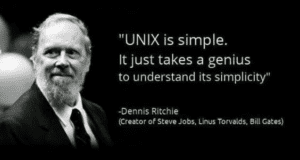C is a programming language. It is a very popular language, In-spite of this old. It is used to create lists of instructions for a computer to follow. The C-language is a general-purpose and procedural-oriented programming language. The C Language is developed by Dennis Ritchie for creating system applications that directly interact with the hardware devices such as
drivers, kernels, etc. C is strongly associated with UNIX, as it was developed to write the UNIX operating system. C language is known as the mother language because it is base of the all
programming languages. C is also called a compiled language, meaning once you write your C program, you must run it through a C compiler to turn it into an executable that the computer can run. Many languages have derived syntax directly or indirectly from the C programming language. For example, C++ is closely a superset of the C language. Also, the C programming language is very popular for system-level apps.
Example of C:
WAP to print “Hello World!”
#include <stdio.h> int main() {
printf(“Hello World!”);
return 0;
}
Advantages of C language
- It is a middle-level
- It is block-structured.
- Programs written in c are highly
- The modular structure makes code debugging, maintenance, and testing
- Cis the building block for other programming
- It is easy to add your own function to the C
- It has 32 keywords so easy to
- Ability to extend
- The compiler is easily
- It is simple and
Disadvantages of C language
- C does not provide a constructor or .
- There is no concept of namespacing in C .
- C does not provide binding or wrapping of data into a single .
- C does not provide oops .
- No run-time .
- The C language does not support oops .
- As the program extends it is difficult to fix the bugs.
- It may be compiled time overhead due to misplacing and excessive use of
History Of C Language
C is a programming language developed by AT & T’s (American Telephone & Telegraph) Bell
Laboratories of USA in 1972. Dennis Ritchie is known as the founder of the C language. It was developed to overcome the problems of previous languages such as B, BCPL, etc. In the late seventies, C began to replace the more familiar languages of that time like PL/I, ALGOL, etc.
No one pushed C. It was not made the ‘omcial’ Bell Labs language. Thus, without any
advertisement, C’s reputation spread, and its pool of users grew. Ritchie seems to have been rather surprised that so many programmers prefer C to older languages like FORTRAN or PL/I, or the newer ones like Pascal and APL. After developing the C language, Dennis Ritchie and Ken Thompson together developed the UNIX Operating System. Later, Ken Thomson further
developed BCPL by developing the first letter of BCPL i.e. he developed the B language. In 1966, Martin Richards developed BCPL (Basic Combined Programming Language before
developing C. Ken Thomson developed a BASIC type of UNIX Operating System, while the B language was in motion. After all this, by further developing the B language, Dennis Ritchie developed the C language in the Bell laboratory In 1978, Kerni Ghan and Ritchie both did further improvements in the C language and they brought the C programming language in front of the whole world. But, that’s what happened. In 1989, ANSI C was developed by
the ANSI Committee. In 1999, The new version of C was developed, In which has new features like Data Types- char, float, int, and double used.
Features Of C Language
It is a High-Level Language and the platform depends on language.
It is also a small language you can easily learn this language having just 32 keywords.
C language is a core language as many other programming languages are dependent on C language.
C language programs are portable because the program you write in C language can run that program on different machines also it is not dependent on the machine.
It is an extensible language.
It has built-in functions and operators those functions you can use and write down any complex program.
C provides a lot of inbuilt functions that make development fast. It is a structured language and supports modular programming.
It supports the use of pointers so you can directly access the memory.
The compilation and execution process of a program is faster as compared to other languages.
Support features of dynamic memory allocation.
In C language, we can free the allocated memory at any time by calling the free() function.
C is a case-sensitive language.
It is used to develop and operate an embedded system which is why it is also known as a system programming language.
Simple: It is a simple language, it provides a structured approach, and teach a set of
library function.
Extensible: It can easily adopt new features of other technology.
Speed: The compilation and execution time of C is very fast.
Portable: It is machine independent like assembly language. But it is not platform- independent.
Memory Management: It supports DMA(Dynamic Memory Allocation) like new, free, and
delete.
Rich Library: It provides inbuilt functions that make development very fast.


Helpful